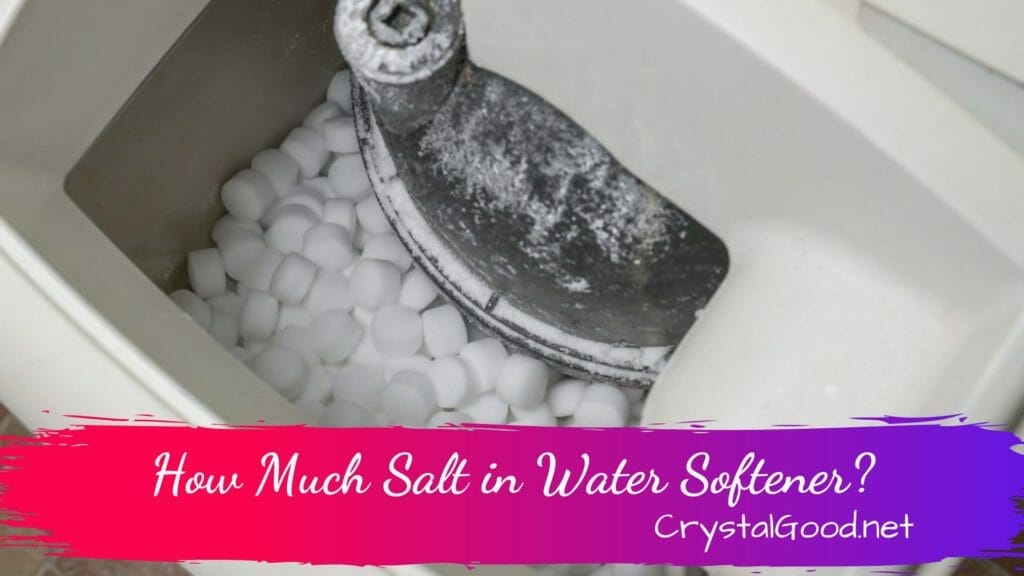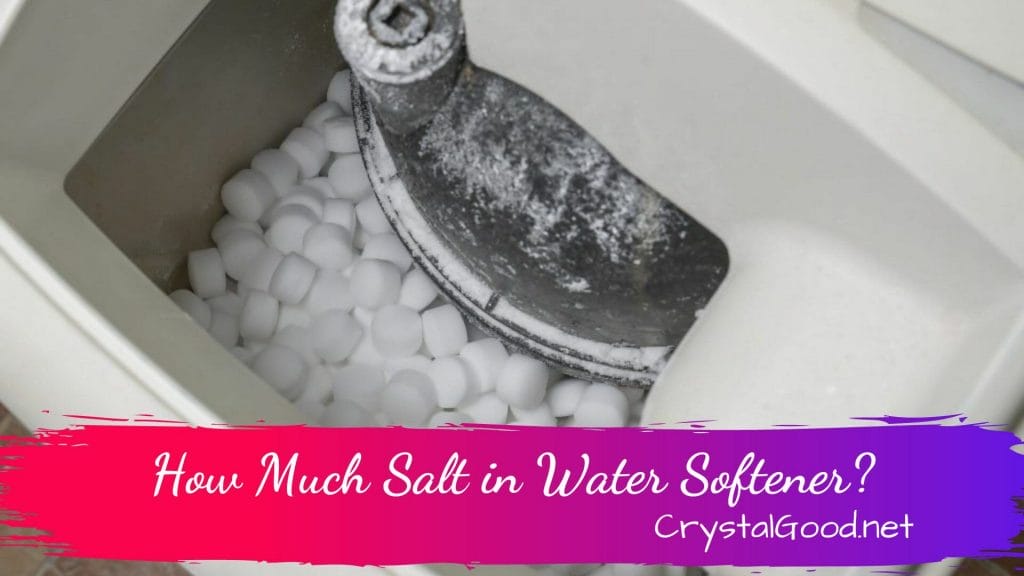Have you ever wondered how much salt goes into a water softener? It is a valid question, as the salt dosage used in water softeners can seem high. Here we are going to take a closer look at how much salt is needed in a water softener and what effects it has on your home’s plumbing. We will also explore some alternate methods for softening your water that require less or no salt at all. So, keep reading to learn more!

Is a water softener necessary for every household?
Contents
- 1 Is a water softener necessary for every household?
- 2 How often should I regenerate my water softener?
- 3 Can I install a water softener myself?
- 4 How does a water softener work?
- 5 What are the benefits of having a water softener?
- 6 How do I know if I need a water softener?
- 7 How Much Salt in Water Softener?
- 8 Conclusion:
Whether you need a water softener depends on the amount of water you use. The average American uses about 65 gallons per day. However, homes that use a lot of water can use closer to 100 gallons a day.
Using a water softener is a good way to cut down on water usage. A water softener reduces mineral build-up in plumbing fixtures and reduces the impact of corrosion. This helps appliances last longer and reduces chemical cleaner costs.
Water softeners work by replacing calcium and magnesium ions with potassium or sodium. This can make the water feel cleaner and rinse cleaner. Soft water can help you avoid itchy, dry skin, brittle hair and dandruff.
Hard water can also muck up important home parts. Hard water ions corrode plumbing systems and internal home systems, which can lead to health risks.
Water softeners can also reduce the frequency of appliance replacement. Because they replace the minerals, the appliances will work more efficiently. The result is lower water heating costs and less frequent appliance replacement.
How often should I regenerate my water softener?
Depending on your water softener, you may need to regenerate your softener on a regular basis. Some softeners regenerate daily, while others may need to regenerate several times a week. The frequency of regeneration is determined by your water softener’s capacity, as well as your water hardness.
The regeneration process of a water softener is a critical step in maintaining the system. Regeneration is necessary to keep the resin bed active and free of minerals. The resin bed is made of beads, which pull minerals from water. The beads become clogged with minerals over time. If the resin bed is too clogged, the water softener will not function properly. A regeneration cycle flushes out the minerals, leaving you with soft water.
Regeneration is the process of flushing out the minerals from the resin bed with brine solution. The brine solution is a mixture of water and salt. The brine solution passes through the resin bed and replaces the minerals with sodium.
Regeneration can be set manually or automatically through your control valve. Many newer water softener models have digital displays with default settings. The display will tell you when it’s time to regenerate.
Can I install a water softener myself?
Getting a water softener installed is important. It can help reduce the buildup of minerals such as scale and limescale that can lead to damage to appliances and other plumbing fixtures. However, installing a water softener can be a daunting task.
While it is possible to install a water softener yourself, you may want to consider hiring a professional. Not only will a professional make sure the job is done correctly, but they will also provide you with peace of mind.
Installing a water softener can be a daunting task, but there are some steps you can take to make the process easier. First, make sure you have the proper tools. You may need to purchase these tools or borrow them. Also, it’s a good idea to make a detailed checklist of all the steps you need to complete.
Another important step is deciding where to place the water softener. Typical placement involves placing the device near the point where your water enters the house. This will ensure that the softened water stays inside your home, instead of leaking outside. You may also need to adjust your water supply lines to accommodate the installation.
How does a water softener work?
Typically, a water softener works to provide softened water. It does this by removing hardness minerals. These minerals can cause problems such as clogging your pipes and forming scale on your appliances. They also leave negative effects on your hair, skin, and appliances.
Water softeners work by using a process called ion exchange. It involves swapping positive mineral ions for sodium ions. The ions become bound to water molecules, which in turn create softened water.
The resin in the softener tank is negatively charged. Its beads are covered in particles of sodium. When the softener is regenerated, the beads are filled with sodium ions. This sodium ion helps to balance the water in the system.
The beads are then rinsed with a salt water solution. The solution flushes out the hard minerals and cleans the beads.
The salt water solution is then pumped through the resin tank. Once the resin tank is filled, the water softener enters a regeneration cycle. It uses the ion exchange process to remove the calcium and magnesium ions.
What are the benefits of having a water softener?
Having a water softener can offer many benefits. It can help you save on cleaning costs, reduce your water bill, and improve the quality of your water. It can also help prevent the buildup of scale and mineral deposits in your plumbing. These build ups can cause additional wear and tear on your major appliances.
A water softener can also help you get rid of chlorine and hydrogen sulfide odors. These odors are a result of mineral deposits in your drinking water. They can leave a rotten egg smell, and they can also be harmful to your health.
Soft water will also make your hair softer. If you have brittle, dry hair, it may be because of a buildup of magnesium and calcium in your water. Soft water will also help you get rid of dry, itchy skin.
Soft water also helps you save money on bottled water. Many people prefer soft water over hard water. It can also help you save on soap. Hard water will make soap scum stick to your dishes. Soft water will allow soap to fully dissolve and remove soap scum more easily.
How do I know if I need a water softener?
Having hard water can leave stains on your sink, tub, and fixtures. It can also dry out your hair and skin. It may even cause leaks in your pipes. If you have this type of water in your home, a water softener might be your best bet for cleaner water and cheaper plumbing repairs.
Water softeners use a process known as ion exchange to remove excess calcium and magnesium ions from the water. The water softener then recharges the system with new sodium ions. Softeners use less water pressure and less salt. In addition, they can extend the lifespan of plumbing and appliances.
Water softeners are not a necessity for every household. However, they can be useful to prevent clogged pipes, wear and tear on plumbing, and defective fixtures. They can also save you a lot of money over the long run.
It’s not uncommon for a water softener to use 25 gallons of water per day. In addition to this, they can last between 8 and 12 years. If you have a water softener in your home, it’s important to check on it from time to time to make sure it’s working correctly.
How Much Salt in Water Softener?
During the regeneration cycle of your water softener, salt is added to the brine tank. The salt is mixed with the water and the brine solution is transported from the brine tank to the media tank. The water softener then softens the water.
The amount of salt used by your water softener depends on a number of factors. The size of the brine tank, the type of salt used, and the number of people in your household all contribute to how much salt your water softener uses.
Larger families require more salt than smaller families. Typically, a household with four people will use about ten pounds of salt per week. However, a family with six people will use about three times that much.
The average family of four with hard water will use about 40 pounds of salt per month. The amount of salt used by a family of six with soft water will be about 43 pounds of salt per month.
The frequency of salt use in a water softener depends on the amount of water consumed and the size of the tank. Most systems are able to be adjusted to use more or less salt each month. The water softener owner’s manual will provide you with recommendations on how much salt to use.
Conclusion:
Getting access to softened water is an important step in protecting your family’s health. If you have a water softener, you must ensure that your salt levels are properly maintained.
If your salt levels are too high, you may experience problems with your system. This includes reduced efficiency, increased regeneration time, and decreased water pressure. If your system is too salty, you can fix this by draining it and replacing it with fresh water.
Too much salt in your water softener can also make it harder to remove minerals from your water. This can lead to a buildup of soap scum and clogs in your shower and drains. It is important to ensure that you replace your water softener salt regularly.
Depending on the type of water softener you have, you may be able to reduce the amount of salt in your water softener. Using Epsom salt, table salt, or potassium chloride can be a good alternative. These salts are less expensive than sodium chloride.
You will need to replace your water softener salt at least once a year. A general rule of thumb is to use about half a cup of salt for every five gallons of water.













